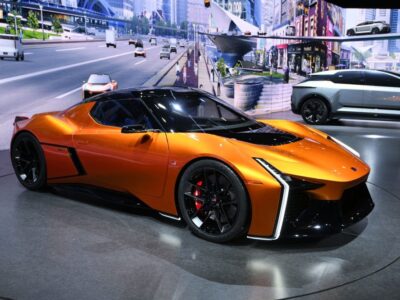(Bloomberg) —
Ford Motor Co. is investing $3.7 billion in factories across three Midwestern US states to pump out more electric vehicles and traditional gasoline-fueled autos in a sweeping expansion that will create 6,200 union jobs.
Five Ford plants will be expanded to produce more hot sellers, such as the electric F-150 Lightning pickup, and roll out new models, including a battery-powered commercial vehicle to be built at the automaker’s factory in Avon Lake, Ohio, the company said Thursday in a statement.
The timing of the investments are unusual, coming more than a year before Ford is set to negotiate a new four-year contract with the United Auto Workers. Normally, the automaker would wait and use potential factory enhancements and new jobs as leverage in talks with the union.
But in a tight labor market, Ford is moving quickly to secure the workers it needs. It could also get on the UAW’s good side a year after the union accused the automaker of “corporate greed” for moving some EV production to Mexico from Ohio.
With the economy roiled by inflation, Ford is scoring political points by expanding in the industrial Midwest. President Joe Biden hailed Ford’s announcement as “great news for American workers” and was quick to claim credit for the new jobs.
“This isn’t an accident,” Biden said in a statement. “It’s the result of my economic plan to grow the economy from the bottom up and middle out.”
The investment is part of Ford Chief Executive Officer Jim Farley’s strategy to produce 2 million EVs by 2026, up from 27,140 last year, and to use Ford’s lucrative gas burners as the “profit and cash engine” that drives its electric ambitions. Ford said plants in Michigan will receive a new Mustang coupe and redesigned Ranger pickup, which pump out profits along with greenhouse gases.
Ford also said Thursday that its EV sales rose 222% in May to 6,254 models, as it delivered its first F-150 Lightnings and the battery powered Mustang Mach-E had its best month yet. Farley on Wednesday said he doesn’t believe Ford’s EVs will require advertising to promote them to consumers.
Ford will also convert 3,000 temporary workers at the Midwestern factories to permanent full-time status, with immediate health-care benefits. The automaker said all 6,200 of the new workers will be represented by the UAW. Ford employs about 56,000 hourly workers in the US.
The company said it will spend about $1 billion to improve working conditions at its plants, including giving employees access to healthier foods and adding better lighting in parking lots.
Ford’s shares rose 2.4% to $13.88 at 11:55 a.m. in New York. The stock slumped 35% this year through Wednesday’s close, worse than the 14% slide in the S&P 500.
Southern Expansion
These latest investments are a counterpoint to the $7 billion Ford is spending to build a vast EV complex in Tennessee, dubbed Blue Oval City, and two battery plants in Kentucky, employing a total of 11,000 workers. Those workers, located in right-to-work states, will only be unionized if they vote to be represented, Farley has said.
“As far as Kentucky and Tennessee goes, the new employees at the new assembly and battery plants will be able to choose whether they organize and we absolutely respect and support the employees’ right to make that choice,” Kumar Galhotra, president of Ford Blue, the company’s unit producing traditional internal combustion engine vehicles, said in a briefing with reporters.
More than half of the newest investment dollars will go to Ford’s home state of Michigan, where the company expects to create 3,200 jobs. Ohio will get 1,800 new positions through a $1.5 billion investment, while $95 million will go toward the Kansas City Assembly Plant in Missouri. Galhotra said Ohio provided $200 million in incentives and Michigan gave $150 million to land the new investments.
Ford’s southern expansion caused heartburn in Michigan, which has higher utility and labor costs than its neighbors. Fears of the American auto industry’s birthplace being left behind arose again last week when Stellantis NV and South Korean battery maker Samsung SDI Co. announced plans to build a $2.5 billion battery plant in Kokomo, Indiana.
“The state’s batting average stinks,” business columnist Daniel Howes wrote in the Detroit News on May 30. “The self-proclaimed heart of the North American auto industry is losing far more tied-to-the-future investments than it’s winning.”
© 2022 Bloomberg L.P.





